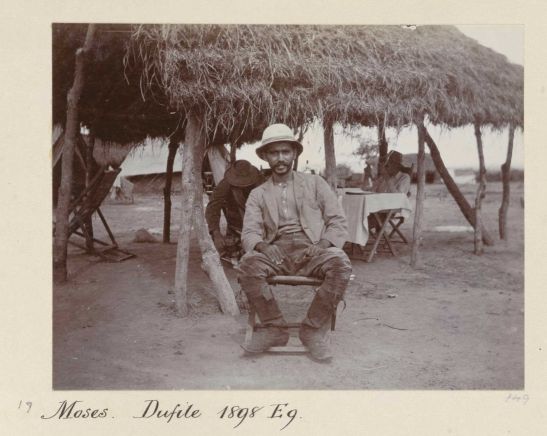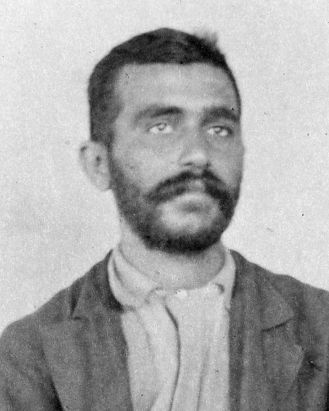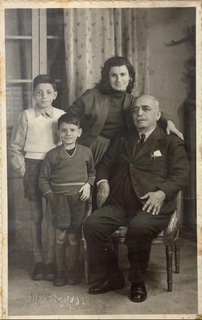View entry
Name: MOSES, Michael OBE



Nee: bro of J.Hagop and Serop Moses, son of Moses Movsessian and Hripsima Melconian
Birth Date: 15 May 1874 Baghdad
Death Date: 1 Oct 1957 Baghdad
Nationality: Armenian
First Date: 1896
Last Date: 1957
Profession: Admin. with Govt BEA, Big Game hunter, Trader, Rubber planter, Coffee etc.
Area: Uganda
Book Reference: Gillett, Cranworth, Boase, North, Playne, EA & Rhodesia, Drumkey, Red 22, UJ, Norden
General Information:
A Purser on the BI line which called at Mombasa he had many opportunities of acquiring info. regarding the potentialities of the hinterland. Resigned from Co. in 1896 - travelled from coast by caravan to Uganda. After nearly 8 years with Govt. became big-game hunter & trader, and eventually the most influential businessman in Kampala. Planted rubber & coffee, was first to export tobacco & later vanilla and pyrethrum. Other main interests Imperial Hotel Kampala & Uganda Herald newspaper.
Cranworth - 1906 - Uganda - met Mr Michael Moses, with whom I had later many business relations. He had been one of the very earliest Govt. servants in Uganda. ........... 1907 - persuaded me to join him in a trading and transport venture. The essence of this project was to trade for ivory up to and across the boundary of the Belgian Congo. .... reasonably successful ....... operated for 3 or 4 years.
Boase - Another pioneer was Michael Moses, an Armenian from Baghdad, who as a very young man was enthralled by tales of the fortune in 'white gold' - elephant tusks - which awaited the intrepid travellers in EA. Having, like the missionaries, endured the trials and tribulations of the walk up from the Coast, his arrival in Kampala coincided with the outbreak of the Sudanese Mutiny, and before he had time to recover from the ravages of his journey, he found himself despatched as Her Majesty's somewhat unlikely representative to the Hoima district with instructions to keep the peace at all costs .... after this he was soon deeply involved in the ivory trade and in such other lucrative propositions as came his way. For several years his life was one long arduous safari, during which he covered on foot vast areas extending into the Belgian Congo. As money became available he bought building plots in the developing townships, and plantations in which he pioneered some of the crops which formed the basis of Uganda's economy, and when I first knew him he was a power in the land - the "uncrowned king" whose counsel was sought by those in high places. ..... The slump ...... Michael Moses' business interests were severely affected. At the time we knew little about his anxieties, as he kept them very much to himself, but years later when his fortunes had been more than retrieved by a timely association with tin-mining in Ruanda-Urundi, he told me that for years all his properties had been heavily mortgaged. .......... 1956 - now well on in his 80's, in indifferent health, extremely deaf and increasingly lonely as all his friends left Uganda. He returned to Iraq for his final days. Playne - The British Trading Company Ltd. - There are plenty of openings for enterprising business men in Uganda. Mr N. [sic] Moses, for instance, came to Uganda in 1896, from India. Formerly on the BISN Company's Line, he joined the Government service, resigned in 1904, and started as an ivory trader. Now he is the general manager for Uganda of the British Trading Company, Ltd., with local headquarters at Kampala and London Offices at Carlton House, Regent Street. The company are general merchants, transport agents, and safari outfitters. They are entirely British, and carry large stocks of hardware, soft goods, and general merchandise, and buy native produce for export, such as ivory, rubber, coffee etc. The principal export business is in ivory. ......... 6 Europeans and a large number of natives are employed. ....... Mr Moses, it may be added, personally owns plantations of 500 acres of rubber, coffee, and cocoa, and also house property.
East Africa & Rhodesia - 24/10/57 - Mr Michael Moses, OBE, who has died at the age of 83 while on a visit to Baghdad, his birthplace, had spent 61 years in Uganda, to the development of which he contributed in many ways, for he had vision, initiative, courage, determination, judgement, and a great gift of friendship. He marched up to Uganda in 1896 and was soon attached as transport officer to a military column. During the Sudanese mutiny and subsequent operations of 1897-98 he was for a time in charge of the garrison at Masindi, and at the time of the Fashoda incident he was again employed on transport duties. Then he joined the embryonic Civil Service of Uganda, from which he resigned in 1903 to go elephant hunting and trading in the Belgian Congo, the Lado area of which, adjoining Uganda and the Southern Sudan, was the happy haunt of the ivory poachers whom John Boyes so well described in "Company of Adventurers". When speaking of those tough times Moses used to say that they were two years from which he emerged "not altogether without profit". It was one of the understatements of a man who always preferred reticence to boastfulness. Returning to Kampala in 1905, he met Dr. H.H. Hunter. Liking one another at first sight, they entered upon a partnership which endured until Hunter's death. At different times both told the writer of this memoir that they had never had a partnership agreement in writing. Six years after the partnership began Hunter, a lawyer, did draft a memorandum because Moses was about to leave for Europe, but, thoroughly trusting his friend, he declined to sign it; and throughout a most successful partnership of something like 40 years there was no legal bond. They began by planting rubber and coffee, and over the years they extended their interests to general import and export trade, to cotton buying and ginning, and to various other forms of agriculture, so that by the end of the first world war (in which Moses served in the campaign against German East Africa) the firm had a more heterogeneous range of interests than any other business house in the country. They were the first to export tobacco and the first to grow and ship vanilla and pyrethrum. In 1912 Moses started the 'Uganda Herald', the pioneer newspaper of the Protectorate, and he retained control until a few years ago.
During the world slump of the thirties, when he lost a large fortune, he had to face deficits on the paper for some years, but he was determined to keep it afloat alone, and he refused at least two offers which were attractive in the conditions in which they were made. Among those who greatly valued Moses' judgement was the late Lord Dewar, who on his suggestion built the Imperial Hotel in Kampala. When his executors wanted to dispose of the property many years later Moses bought it. When he afterwards sold it there was a condition that he should remain a director of the purchasing company. Another interest to which he remained especially attached was a tin mining company which he had helped to start in Ruanda-Urundi. Whether he was struggling against adverse conditions or extremely affluent, Moses remained the same generous-hearted devotee of Uganda. No man, while, black, or brown, has been so well known and so well liked over anything like so long a period in that country. Whenever old-timers foregathered his name was sure to be mentioned, for he had known everyone, been everywhere, done everything, and almost certainly helped more lame dogs than anyone else. There can never have been a more hospitable man in the country, as was shown on one occasion known to the writer. A visitor from London arrived by air in Entebbe three days before Moses was due to make one of his safaris to the Congo. "You must let me give a lunch party for you", Moses pressed. Told that he was already committed for the two intervening days, Moses said: "You must come. I will tell your host that his guests have to come to me". So it was; the 20 or 30 guests of the host were joined to another score or more in Moses's home - then known to provide the best curries in the country. Because all his adult life had been spent in Uganda, a Protectorate, not a Colony, he could not qualify for British naturalisation, and for the same reason he was not appointed a member of the Legislative Council. He served on many public boards and committees, however, and he was awarded first the honorary MBE and later the OBE. His life must have been one of the most colourful among the many tough and colourful characters attracted to East Africa in the early days. Unhappily, he could not be persuaded to write the story, though repeatedly urged to do so. It would almost certainly have been the best book to come out of Uganda.
Drumkey 1909 - Committee Member, Uganda Chamber of Commerce, Entebbe
Uganda Journal - Vol. 20, No. 1 - Uganda Twenty-Five Years Ago by C. Handley Bird CBE - Dr. H.H. Hunter, Michael Moses and George Ishmael, active and vocal members of the legal profession and of the business community.
Uganda Journal - Vol 22 p. 97 - Obituary - 6 pages - In an application, which he made in 1903 for naturalization as a British subject, Michael Moses wrote "I am a Turkish subject born in Baghdad on 15 May 1874. I have been in British territory since 1887 and employed in this [sc. The Uganda] Administration since May 1896." Despite over sixty years of more or less continuous residence in East Africa, and more particularly in Uganda, he kept in touch with his kinsfolk in Baghdad, to whom from time to time he paid brief visits, and it was at Baghdad that he died in October 1957 at the age of 83.
North - Armenian; recruited in India, temporary appt as Clerk UP May 1896; with C.W. Hobley in Nandi country Nov 1896; permanent appt. UP 1-4-1900; Principal Clerk Kampala May Nov 1901; Wadelai July 1901; established Congo Trading Co. with Ahamed bin Rashid March 1903; resigned from UP to concentrate on business - end of appt. 2-1-1904
A. Allen - Not everything that Michael Moses touched turned to profit. More than one of his ventures ended in a loss and in the disastrous world slump of the 1930s he lost the greater part of a large fortune which it took a great deal of time and hard work to restore. But whether in prosperity or diversity he was always the most generous of men. Whilst he could be lavish in his hospitality, he himself led a very simple life and much of the money which he made was used to help people of all races and creeds in their times of distress and adversity.The extent of this generosity will never be fully known because Michael Moses always believed in doing good by stealth. Having enlisted in the Uganda Volunteer Reserve, Moses took part in the German East Africa campaign during the first World War, but since he was born outside of the British Empire and since his more than 60 years under the British flag had been spent in a Protectorate, and not in a Colony, he was never able to qualify for naturalization as a British subject. For that reason he was never appointed a member of Legislative Council, but he was awarded an honorary MBE and later an OBE. He was long a member of the Royal Automobile Club where he would entertain old friends during his visits to London; and one of his joys until recent years was to attend a quiet reunion dinner with the few remaining officers under whom he had served in the stirring days of the Uganda Mutiny.
North - Former Purser with BISN Co.; Temp. Appt. UP as Clerk 1896; with C.W. Hobley in Nandi country Nov. 1896; permanent appt. UP 1/4/1900; Kampala May 1901
Norden 1923 - Kampala, Cotton Row - met White King of Buganda - the name by which he was hailed at Maxims and the great continental gaming tables during his visit abroad a few years ago ........ Not yet old, he has seen the evolution of trade in C. Africa, and has taken a hand in it. ... He came to Uganda a penniless boy adventurer, and he is now the most important individual operator in the protectorate. Oddly, for it so rarely happens, with his tall figure, his black eyes, and moustache and sun-browned skin, the White King looks the part of a soldier of romantic fortune. He was born in India but drifted early to Zanzibar ........ The railway building had not yet begun when he started into the interior from Bagamoyo. ........ He was safer in disguise, so he made up as Arab, Indian or Somali trader, whichever best suited the occasion. ........ Married, never. But there are many love stories in his reminiscences .......... In British Govt. service in the Soudan. Later he was in the Congo country, competing with King Leopold's agents in ivory buying. The Belgians looked upon him as a spy, and natives were forbidden to sell to him, but for all that he managed to get £40,000 in 2 years. Then came the purchase of land in Uganda ............ Knew well both Mutesa and Mwanga ..........….
